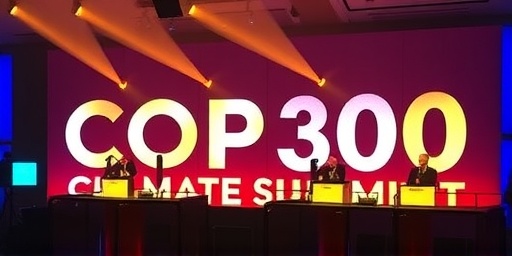In a dramatic pivot at the ongoing COP30 climate summit in Belém, Brazil, negotiators have scrapped a key roadmap for phasing out fossil fuels from the latest draft text, sending shockwaves through international climate talks. This unexpected removal, announced late Wednesday, has escalated tensions among world leaders, environmental advocates, and industry stakeholders, raising urgent questions about the pace of the global energy transition and the feasibility of meeting Paris Agreement goals.
- COP30 Draft Overhaul: Fossil Fuel Roadmap Vanishes Amid Negotiating Stalemate
- World Leaders Clash Over Energy Transition Commitments at COP30
- Historical Echoes: How COP30’s Policy Shift Builds on Past Fossil Fuel Frustrations
- Expert Insights: Analyzing the Fallout for Global Fossil Fuel Phase-Out
- Path Forward: COP30’s Final Push and Beyond for Climate-Resilient Energy Policies
The decision marks a significant departure from earlier drafts that outlined structured timelines for reducing reliance on coal, oil, and gas—fossil fuels responsible for over 75% of global greenhouse gas emissions, according to the Intergovernmental Panel on Climate Change (IPCC). With the summit entering its final days, the absence of this roadmap has intensified debates on energy transition policies, as nations grapple with balancing economic growth, energy security, and climate imperatives.
COP30 Draft Overhaul: Fossil Fuel Roadmap Vanishes Amid Negotiating Stalemate
The core of the controversy lies in the evolving draft text of the COP30 outcome document, which aims to build on previous summits’ commitments. Initial versions, circulated just weeks ago, included a detailed “roadmap for the energy transition,” specifying milestones such as halving fossil fuel production by 2030 and achieving net-zero emissions by 2050. These elements were hailed as a breakthrough following the COP28 pledge in Dubai to “transition away from fossil fuels in energy systems.”
However, sources close to the negotiations reveal that opposition from major fossil fuel producers—led by Saudi Arabia, Russia, and Australia—prompted the removal. “The roadmap was too prescriptive and ignored the diverse realities of developing economies,” said a delegate from the OPEC bloc, speaking on condition of anonymity. The revised draft now focuses on broader “low-carbon pathways,” diluting specific targets for fossil fuel phase-out.
This shift isn’t isolated; it’s part of a broader pattern at COP30, where progress on finance and adaptation has also stalled. The summit, hosted by Brazil under President Luiz Inácio Lula da Silva, was expected to galvanize action on the energy transition, but the draft’s softening has drawn criticism for undermining the urgency of climate science. IPCC data underscores the stakes: global temperatures have already risen 1.1°C above pre-industrial levels, with fossil fuels driving 89% of CO2 emissions from energy use in 2023.
Environmental groups like Greenpeace have labeled the move a “betrayal.” “Dropping the fossil fuel roadmap at COP30 is like removing the brakes from a runaway climate train,” tweeted Executive Director Jennifer Morgan. The policy vacuum leaves unclear how nations will align their Nationally Determined Contributions (NDCs) with the 1.5°C warming limit.
World Leaders Clash Over Energy Transition Commitments at COP30
Reactions from global leaders have been swift and polarized, highlighting deep divisions in the climate summit’s push toward an equitable energy transition. European Union Climate Commissioner Wopke Hoekstra decried the draft change as a “step backward,” emphasizing that the EU’s Green Deal—aiming for 55% emissions cuts by 2030—relies on international solidarity to curb fossil fuel dependence.
“We cannot afford to dilute our commitments when science demands bold action,” Hoekstra stated during a plenary session in Belém. The EU, along with small island nations like those in the Maldives, pushed for reinstating the roadmap, arguing it provides essential guidance for vulnerable countries facing rising sea levels and extreme weather.
On the other side, representatives from fossil fuel-dependent economies defended the revision. India’s Environment Minister Bhupender Yadav highlighted the need for a “just transition” that doesn’t penalize developing nations. “Fossil fuels remain critical for India’s energy security and poverty alleviation; any policy must include trillions in climate finance from historical emitters,” Yadav remarked. India, the world’s third-largest carbon emitter, relies on coal for 70% of its electricity, illustrating the tension between development and decarbonization.
U.S. Special Climate Envoy John Kerry, attending virtually, urged compromise, noting the Biden administration’s Inflation Reduction Act has invested $369 billion in clean energy. Yet, with U.S. elections looming, Kerry’s influence may wane if policy shifts occur post-November. Meanwhile, China’s delegation, the largest emitter globally, remained non-committal, focusing instead on technology transfers for renewables.
These clashes underscore the geopolitical stakes at COP30. A 2024 World Bank report estimates that a delayed energy transition could cost the global economy $2.5 trillion annually by 2050 in climate damages, disproportionately affecting low-income countries.
Historical Echoes: How COP30’s Policy Shift Builds on Past Fossil Fuel Frustrations
To understand the gravity of COP30’s fossil fuel roadmap omission, one must revisit the arc of UN climate negotiations. The 2015 Paris Agreement set the framework for limiting warming to well below 2°C, but fossil fuels were conspicuously absent from its text—a concession to oil-producing states. COP26 in Glasgow introduced the first explicit call to “phase down” unabated coal, yet loopholes allowed continued investment.
COP28’s Dubai summit represented a watershed, with 198 parties agreeing to transition away from fossil fuels for the first time. That pledge, however, lacked enforcement mechanisms, leading to a 2024 UN Environment Programme report showing fossil fuel subsidies reaching $7 trillion globally—more than double clean energy investments. At COP29 in Baku, Azerbaijan, further delays occurred due to the host’s oil-centric economy, setting the stage for COP30’s current impasse.
Brazil’s hosting of COP30 was intended as a corrective, leveraging the Amazon’s biodiversity to spotlight deforestation’s link to fossil fuels. President Lula, in his opening address, vowed to make the summit a “turning point for the energy transition.” Yet, the draft’s evolution reflects persistent challenges: major producers like the G20 account for 80% of fossil fuel extraction, per Global Energy Monitor data.
Experts point to civil society pressure as a counterforce. Indigenous groups at COP30, including Brazilian leader Sonia Guajajara, have protested the policy softening, linking it to land grabs for oil exploration. “Fossil fuels are poisoning our planet; removing the roadmap silences the voices of those most affected,” Guajajara said. This historical context amplifies the debate, positioning COP30 as a litmus test for multilateralism in climate policy.
Expert Insights: Analyzing the Fallout for Global Fossil Fuel Phase-Out
Climate analysts are dissecting the implications of COP30’s draft changes, warning that without a clear energy transition roadmap, the world risks missing critical 2030 emissions targets. Dr. Fatih Birol, Executive Director of the International Energy Agency (IEA), described the removal as “a missed opportunity to accelerate the shift to renewables.” The IEA’s 2024 World Energy Outlook projects that clean energy must grow three times faster than fossil fuels to meet net-zero goals, yet current policies fall short by 30%.
Economists like those at the IMF argue that the policy ambiguity could deter private investment in green tech. “Fossil fuel roadmap provided investor certainty; its absence may prolong subsidy distortions,” noted IMF Chief Economist Pierre-Olivier Gourinchas in a recent briefing. Renewables, now cheaper than coal in 95% of the world per IRENA, stand to lose momentum if COP30 fails to signal commitment.
On the flip side, energy security experts highlight benefits for transitional economies. A report from the Oxford Institute for Energy Studies suggests that a less rigid policy allows for hybrid models, such as carbon capture for natural gas, which could bridge the gap. “The energy transition isn’t linear; COP30’s flexibility acknowledges that,” said analyst Amy Myers Jaffe.
Statistics paint a stark picture: Global fossil fuel demand hit a record 103 million barrels per day in 2023, with projections rising to 105 million by 2028 without stronger policies. At COP30, side events have showcased innovations like green hydrogen, but skeptics question scalability without a binding roadmap.
Women’s rights and youth activists have also weighed in, emphasizing equity. UN Women reports that climate impacts from fossil fuels disproportionately affect women in the Global South, who comprise 80% of those displaced by disasters. Groups like Fridays for Future demand reinstatement, viewing the draft as a regression in intergenerational justice.
Path Forward: COP30’s Final Push and Beyond for Climate-Resilient Energy Policies
As COP30 barrels toward its December 13 close, ministers are convening high-level huddles to salvage a viable outcome. Brazilian diplomats are floating compromises, such as voluntary national roadmaps for fossil fuel reduction tied to $100 billion annual climate finance pledges—long overdue since the 2009 Copenhagen Accord.
Looking ahead, the summit’s legacy will hinge on whether it restores momentum for the energy transition. Post-COP30, countries must submit updated NDCs by 2025, and the absence of a global fossil fuel framework could weaken these submissions. Analysts predict intensified bilateral deals, like the U.S.-EU clean energy partnerships, to fill the void.
Optimism persists in renewable growth: Solar and wind capacity surged 50% in 2023, per REN21, outpacing fossil fuels. Yet, without policy anchors from COP30, the transition risks uneven progress, exacerbating inequalities. Global leaders, from Lula to UN Secretary-General António Guterres, have called for unity, with Guterres warning, “The climate crisis is not a negotiation; it’s a survival imperative.”
The debate at this climate summit will undoubtedly shape energy policy for years, determining if humanity can pivot from fossil fuels before tipping points like permafrost thaw become irreversible. Stakeholders now watch closely as Belém’s halls echo with the weight of our shared future.








